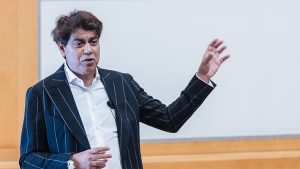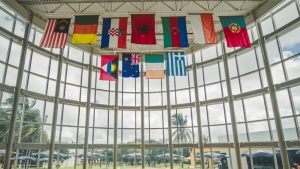 Chapman School Associate Dean Tomislav Mandakovic, right, meets with universities and their students in China. |
It’s no surprise that prospective students and other business school administrators want to learn more about what the College of Business Administration at Florida International University can offer them. What may be surprising is that many of the interested parties are in China.
A recent visit took Tomislav Mandakovic, associate dean, Chapman Graduate School, and Peng Lu, director of China projects for the university, to Qingdao and Beijing from April 4-9, 2007.
“The president of Qingdao University hosted a formal dinner in my honor at which he expressed a high opinion of our programs,” said Mandakovic, who traveled to China twice before to lay the groundwork for the relationship.
In addition to taking part in the social occasion and meetings with officials, he made two presentations: The first, to a group of about 150 students, most of them seniors, focused on the International MBA (IMBA) program; the second, to an audience of about 100 master of management students, centered on the college’s Dual Degree program.
This program enables students to complete an MBA from their home universities and a Master of International Business (MIB) from Florida International University in considerably less time than it would take if they pursued the two degrees sequentially. Currently, students from 23 universities worldwide, including Qingdao University, participate in the Dual Degree network.
“Chinese business students are extremely interested in participating in our graduate programs.”
—Tomislav Mandakovic, associate dean, Chapman Graduate School
“Chinese business students are extremely interested in participating in our graduate programs, since they are fully aware of globalization and the important role a global graduate business education plays in positioning China in this context,” Mandakovic said.
Prospects in China expand.
 From left: Ardell Yang Division Chief, Tomislav Mandakovic, and Xiaojun Jin deputy director, Dong Fang International Center for Educational Exchange China Scholarship Council Ministry of Education. |
During their stay in Qingdao, Lu and Mandakovic met with representatives from Ocean University of China, a highly ranked technological institution that has started a business program, and Shandong Economic University, ranked as the number eleven school in China. The visits were part of the Chapman School’s effort to continue to grow the Dual Degree network by attracting prestigious universities in other countries.
Mandakovic and Lu also visited Beijing, where Mandakovic presented at the People’s University of China to about eighty undergraduates, and at the China Scholarship Council, to approximately forty parents and students primarily interested in the IMBA program.
Shandong Economic University reciprocates with a May visit to Modesto A. Maidique Campus.
 Representatives from Shandong Economic University visit the college on May 29, 2007, and sign a Memoradum of Understanding to join the Dual Degree network of participating schools. |
The international conversation continued on May 29, 2007, when a group of six executives from Shandong Economic University, headed by its president, visited the campus, where Mandakovic hosted them. During the day, they met with University President Modesto Maidique; Executive Dean Joyce J. Elam; José de la Torre, dean, Chapman School; Anna Pietraszek (EMBA ’06), admissions and international partnerships; Jerry Haar, professor, Department of Management and International Business, and associate director, Knight Ridder Center for Excellence in Management; and Robert Garcia (EMBA ’97), director, Executive and Professional Education (EPE). Representatives from both institutions signed a memorandum of understanding—the next formal step in creating a Dual Degree partnership.
“We plan to implement Dual Degree and EPE programs and to complete a joint research project comparing the development of small businesses in China with those in Florida,” Mandakovic said. “The latter should lead to a research center on trade in China, Florida, the United States, and Latin América.”




